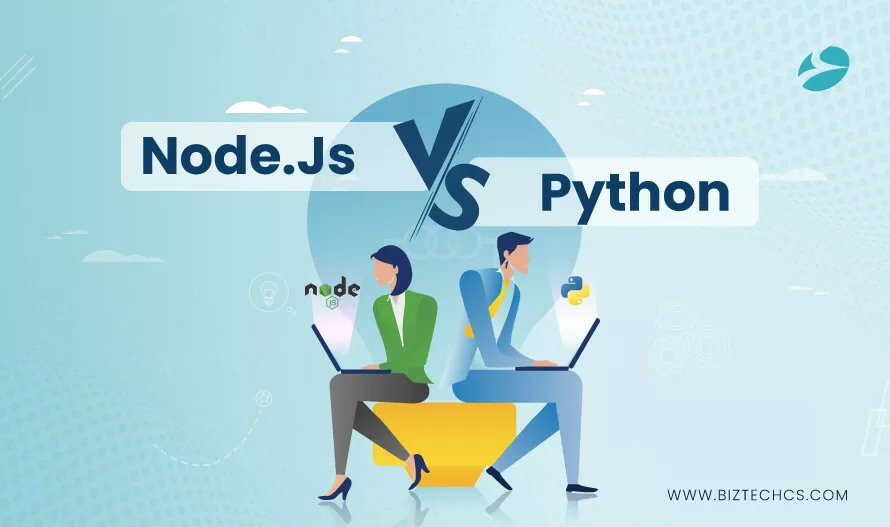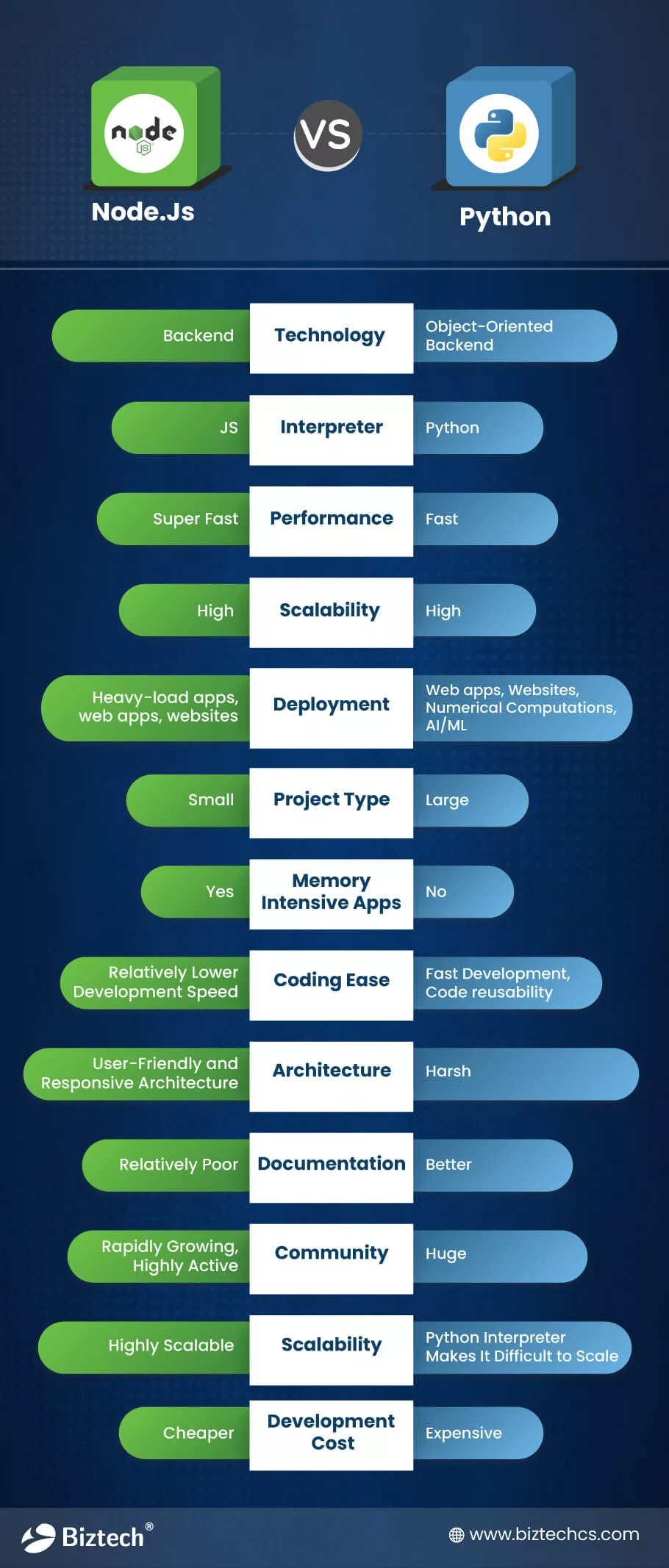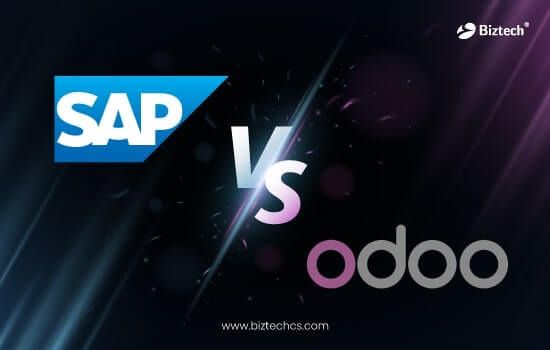4151
NodeJS vs Python Comparison: Pick Your Best Backend Framework in 2023
22 Aug, 2023
7 min read
4151
22 Aug, 2023
7 min read
Table of Content:

In today’s web development context, choosing the perfect backend framework can mean the difference between a smooth journey and a bumpy ride. You pick the right platform for your website and have a seamless development experience with a perfectly-functional web app.
However, the wrong choice can cost you time, money, and customer experience! Lucky for you, we have put together this illustrative comparison guide on NodeJS vs Python technologies.
In the ever-evolving landscape of 2023, we’re here to guide you on a journey to pick the perfect backend companion for your digital ambitions.
Get ready to dive into the Node.js vs Python comparison where we unravel the intricacies, strengths, and quirks of these backend powerhouses; All before you choose to hire Nodejs developers or Python developers for your project.
Initial Release Date: 27 May, 2009
Programming Languages: Javascript, C, C++, Python, CoffeeScript
Operating systems: MS Windows, Linux, z/OS, macOS, SmartOS, OpenBSD, FreeBSD
Nodejs is a cross-platform, backend runtime environment suitable for running JavaScript code. It is used mostly for server-side or backend development of your web application.
Since there are plenty of other technologies like React js, Vue js, Express js, and Angular js that support frontend development using JS, using the same JS for the backend seems convenient. Developers don’t have to worry about learning other technologies and there can be better communication between the front and back end.
It stands out for its event-driven, non-blocking architecture, which ensures efficient handling of multiple connections and real-time interactions. This feature makes Node.js particularly suitable for applications that require speed and scalability.
First Released: 20 February 1991
OS: Windows, Android, Linux, Unix, macOS, etc.
Python is an object-oriented, general-purpose, high-level programming language known for its readability and simplicity. It is widely used across various domains, including web development, data analysis, artificial intelligence, automation, and more. Python’s clean syntax and extensive standard library make it a popular choice for both beginners and experienced developers.
It’s often used for web development with frameworks like Django and Flask, creating dynamic and interactive websites. In short, Python’s flexibility, rich ecosystem, and ease of use make it a versatile language for an array of applications, making it a preferred choice among developers and organizations alike.
P.S.: People often perceive Python programming language as a Python backend framework. However, it is to note that it’s a programming language that can be used with many programming languages.

Before we start comparing Python vs Nodejs, let’s understand that Python is a programming language while Nodejs is a runtime environment for JS
Now, let’s compare two prominent contenders in the world of backend development, to help you decipher their strengths, weaknesses, and decide the one that aligns better with your project goals.
I. Nodejs vs Python:Speed and Performance
When choosing a backend technology, speed & performance are the most important aspects that we look for. Your application has to load fast so your customers don’t abandon your site in the first place and then every web element and process should work perfectly.
Thus, let’s first compare Python vs Node Js performance!
Winner: Nodejs
II. Nodejs vs Python: Scalability
When you develop an application, making it scalable is quite essential as you need to accommodate the growing needs of your customers.
Winner: Nodejs
III. Nodejs vs Python: Extensibility
While working with a backend platform, you should be able to add more features and functionalities to the base platform. It ensures you can build a website or app as per your unique requirements.
Winner: Both! It’s a tie
IV. Nodejs vs Python: Error Handling
Winner: Python
V. Nodejs vs Python: Architecture
Winner: Nodejs
VI. Nodejs vs Python: Community Support
Winner: Both! It’s a tie
VII. Nodejs vs Python: Use Cases
Node.js shines in scenarios that require real-time interactions and handling numerous concurrent connections. Its efficiency in managing I/O operations ensures responsiveness and smooth user experiences, crucial for applications where instant updates and interactions are essential.
For example,
Python’s versatility empowers it to excel in various domains. It is widely used in web development, with frameworks like Django and Flask offering efficient solutions for building dynamic websites.
To conclude, Node.js is ideal for real-time applications that prioritize responsiveness, while Python’s versatility makes it a powerhouse across web development, data science, machine learning, automation, and more.
Clearly, it boils down to your specific project requirements! You need to check if the particular technology seems to fit your requirements and choose the one accordingly, be it Nodejs or Python.
You can also look for other alternatives to node.js and compare Reactjs vs Nodejs, Node Js vs Flask, or other technologies as needed.
Now that you have gone through the various points of comparison, you must have understood which one is best for you. Though Node js may appear a bit ahead of Python, it is truly no means of comparison for your unique needs.
The choice between Node.js and Python depends on your project’s specific requirements and goals. Keep those points in mind and make a sound decision for your project.
Having trouble choosing the right backend technology for your web app? Our developers can help you with that. With 16+ years of experience in multiple technologies, BiztechCS has ventured into multiple projects with several cutting-edge technologies.
Our consultants can also help you decide on the best platform for your project! Hurry, contact us today.

Development
240
By Devik Gondaliya
09 Jul, 2025

Odoo
7876
By Biztech
04 Jul, 2025
Odoo
522
By Devik Gondaliya
02 Jul, 2025